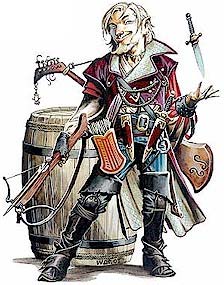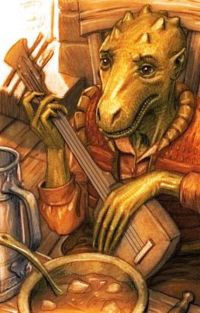Bard


The class that can do a little of almost everything, just not so well. A lot of people think they suck, though this only really reflects on their support class feel, even without the powerful healing of a cleric or druid.
In 1st edition Bards were known for the very complicated method of getting into their class, you'd have to switch between three classes over the course of over ten levels (the three classes being fighter, rogue and druid.) It was basically so ridiculous that TSR decided to drop this silly nonsense for 2e and just make them a normal class.
The primary focus of bards is their party-buffing "Bardic Music" ability, which when combined with a high Charisma score and lots of ranks in Perform can work wonders for a combat-heavy party. A bard can also easily enter the Dirgesinger class (From Libris Mortis), if you feel inclined to play an emo-rockerboy who summons undead and horrifies enemies to death. (Be warned, you may lose the will to live and/or perform rock-ballads that cause party members to lose bowel control from the awesome).
If your party is interested in roleplaying, the performer/scoundrel aspect of the bardic class offers lots of opportunities for acting in character. As bards are the quintessential fantasy musicians, roleplaying a a drunken, semifamous bard could be quite rewarding, and even more infuriating to your party.
As noted above, bards combine some of the elements of almost every class, but the price they pay for versatility is ineffectiveness. Bards will never outshine any core class in their specific role (unless you use splat-books, like most people do now, and with the possible exception of party skillmonkey), but make suitable fill-ins for almost any class. Bards are rather good in traditional rogue missions (Break into this castle, steal shit, come back.) because of their ability to cast arcane spells and wide range of class skills. Of course, a Arcane Trickster could outdo a bard. A party made solely out of bards won't actually be that gimped, though no one in the party will be really good at anything besides singing or other Cha related things unless they start taking PrCs and splatbook feats.
Bards are, however, pretty pathetic in simple combat. A bard cannot fill the place for a barbarian, fighter or ranger; he cannot hope to match the combat abilities of these more martial classes... without splatbooks. (Am I the only one that's heard of Snowflake Wardance?).
(Get with the program people. 90% of 3.5 classes are better fighters than the fighter. Excluding the bard, who simply sucks at everythin- DISREGARD THAT, I ROLLPLAY. DISREGARD THAT, BARDS ARE TIER 3 FIGHTERS ARE TIER 5. *DOUBLE DISREGARD THAT* IF YOU ARE PLAYING 4E{furfag} they are tier 2)
Since bards are traditionally rolled to make other members of your party groan, they are masterfully applied to the gnome. If you need proof of their magical ability to annoy, think about the dirgesinger. Think about how they can take "Perform: Gong" as their instrument.
In 5th edition, Bards have a few mechanical changes. The horribly broken Bardic Knowledge has been removed (because bards were essentially omniscient at even mid-level). They can get up to 9th level spells now, they get 3 instruments, and they are capable of dealing more damage (in the form of better offensive spells and more weapon profs), but the most notable change is how their Bardic Inspiration works. Instead of providing a constant bonus, they bestow a floating D6 upon whomever they inspire. The inspired can roll that D6 and add it to any roll (attack, damage, saving throw) during combat. As they level up, this expands to higher dice sizes, and eventually the bard can even anti-inspire his enemies, forcing them to take a penalty on any roll of his choosing. Also hilarious is the Bard-only cantrip Vicious Mockery, where the bard literally insults someone so hard they take psychic damage from it. The bard has two choices at 3rd level: the battle bard, which gives him medium armor, more weapons, and makes him able to inspire while stabbing, or the Knowledge bard, who gets more skills than the Rogue and also borrows spells from other classes.

| Dungeons & Dragons 4th Edition Classes | ||
|---|---|---|
| Player's Handbook 1 | Cleric • Fighter • Paladin • Ranger • Rogue • Warlock • Warlord • Wizard | |
| Player's Handbook 2 | Avenger • Barbarian • Bard • Druid • Invoker • Shaman • Sorcerer • Warden | |
| Player's Handbook 3 | Ardent • Battlemind • Monk • Psion • Runepriest • Seeker | |
| Heroes of X | Blackguard* • Binder* • Cavalier* • Elementalist* • Hexblade* • Hunter* • Mage* • Knight* • Protector* • Scout* • Sentinel* • Skald* • Slayer* • Sha'ir* • Thief* • Vampire* • Warpriest* • Witch* | |
| Settings Book | Artificer • Bladesinger* • Swordmage | |
| Dragon Magazine | Assassin | |
| Others | Paragon Path • Epic Destiny | |
| *·: Non-AEDU variant classes | ||
| The Classes of Pathfinder 1st Edition | |
|---|---|
| Core Classes: | Barbarian - Bard - Cleric - Druid - Fighter - Monk Paladin - Ranger - Rogue - Sorcerer - Wizard |
| Advanced Player's Guide: |
Alchemist - Antipaladin - Cavalier Inquisitor - Oracle - Summoner - Witch |
| Advanced Class Guide: |
Arcanist - Bloodrager - Brawler - Hunter - Investigator Shaman - Skald - Slayer - Swashbuckler - Warpriest |
| Occult Adventures: |
Kineticist - Medium - Mesmerist Occultist - Psychic - Spiritualist |
| Ultimate X: | Gunslinger - Magus - Ninja - Samurai - Shifter - Vigilante |